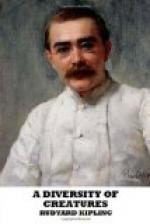‘I’ll lend you goggles,’ I said. ‘My car is under repairs.’
The hireling who had looked to be returned to London spat and growled on the drive. She was an open car, capable of some eighteen miles on the flat, with tetanic gears and a perpetual palsy.
‘It won’t make the least difference,’ sighed the Agent-General. ’He’ll only raise his voice. He did it all the way coming down.’
‘I say,’ said Penfentenyou suspiciously, ’what are you doing all this for?’
‘Love of the Empire,’ I answered, as Mr. Lingnam tripped up in dust-coat and binoculars. ’Now, Mr. Lingnam will tell us exactly what he wants to see. He probably knows more about England than the rest of us put together.’
‘I read it up yesterday,’ said Mr. Lingnam simply. While we stowed the lunch-basket (one can never make too sure with a hired car) he outlined a very pretty and instructive little day’s run.
‘You’ll drive, of course?’ said Penfentenyou to him. ’It’s the only thing you know anything about.’
This astonished me, for your greater Federationists are rarely mechanicians, but Mr. Lingnam said he would prefer to be inside for the present and enjoy our conversation.
Well settled on the back seat, he did not once lift his eyes to the mellow landscape around him, or throw a word at the life of the English road which to me is one renewed and unreasoned orgy of delight. The mustard-coloured scouts of the Automobile Association; their natural enemies, the unjust police; our natural enemies, the deliberate market-day cattle, broadside-on at all corners, the bicycling butcher-boy a furlong behind; road-engines that pulled giddy-go-rounds, rifle galleries, and swings, and sucked snortingly from wayside ponds in defiance of the notice-board; traction-engines, their trailers piled high with road metal; uniformed village nurses, one per seven statute miles, flitting by on their wheels; governess-carts full of pink children jogging unconcernedly past roaring, brazen touring-cars; the wayside rector with virgins in attendance, their faces screwed up against our dust; motor-bicycles of every shape charging down at every angle; red flags of rifle-ranges; detachments of dusty-putteed Territorials; coveys of flagrant children playing in mid-street, and the wise, educated English dog safe and quite silent on the pavement if his fool-mistress would but cease from trying to save him, passed and repassed us in sunlit or shaded settings. But Mr. Lingnam only talked. He talked—we all sat together behind so that we could not escape him—and he talked above the worn gears and a certain maddening swish of one badly patched tire—and he talked of the Federation of the Empire against all conceivable dangers except himself. Yet I was neither brutally rude like Penfentenyou, nor swooningly bored like the Agent-General. I remembered a certain Joseph Finsbury who delighted the Tregonwell Arms on the borders of the New Forest with nine’—it should have been ten—’versions of a single income of two hundred pounds’ placing the imaginary person in—but I could not recall the list of towns further than ‘London, Paris, Bagdad, and Spitsbergen.’ This last I must have murmured aloud, for the Agent-General suddenly became human and went on: ‘Bussorah, Heligoland, and the Scilly Islands—’




